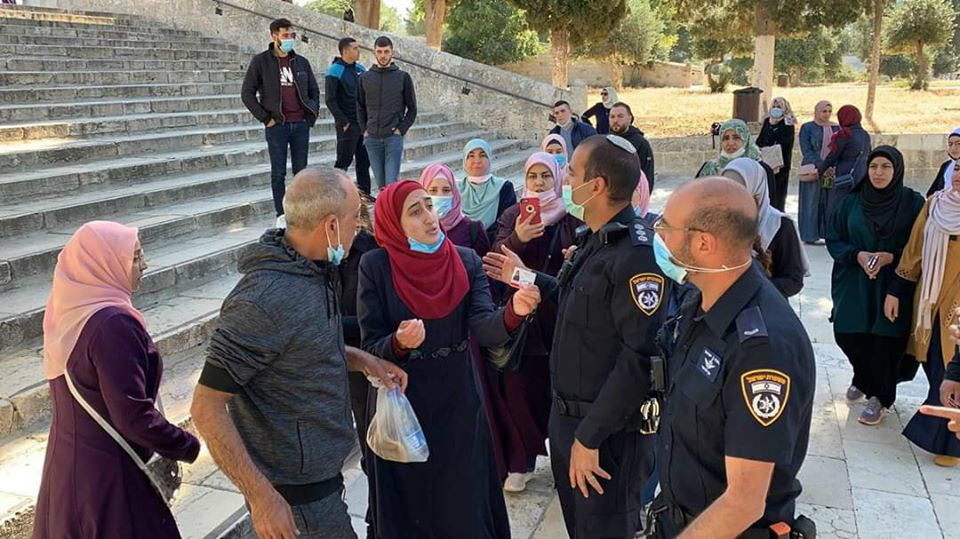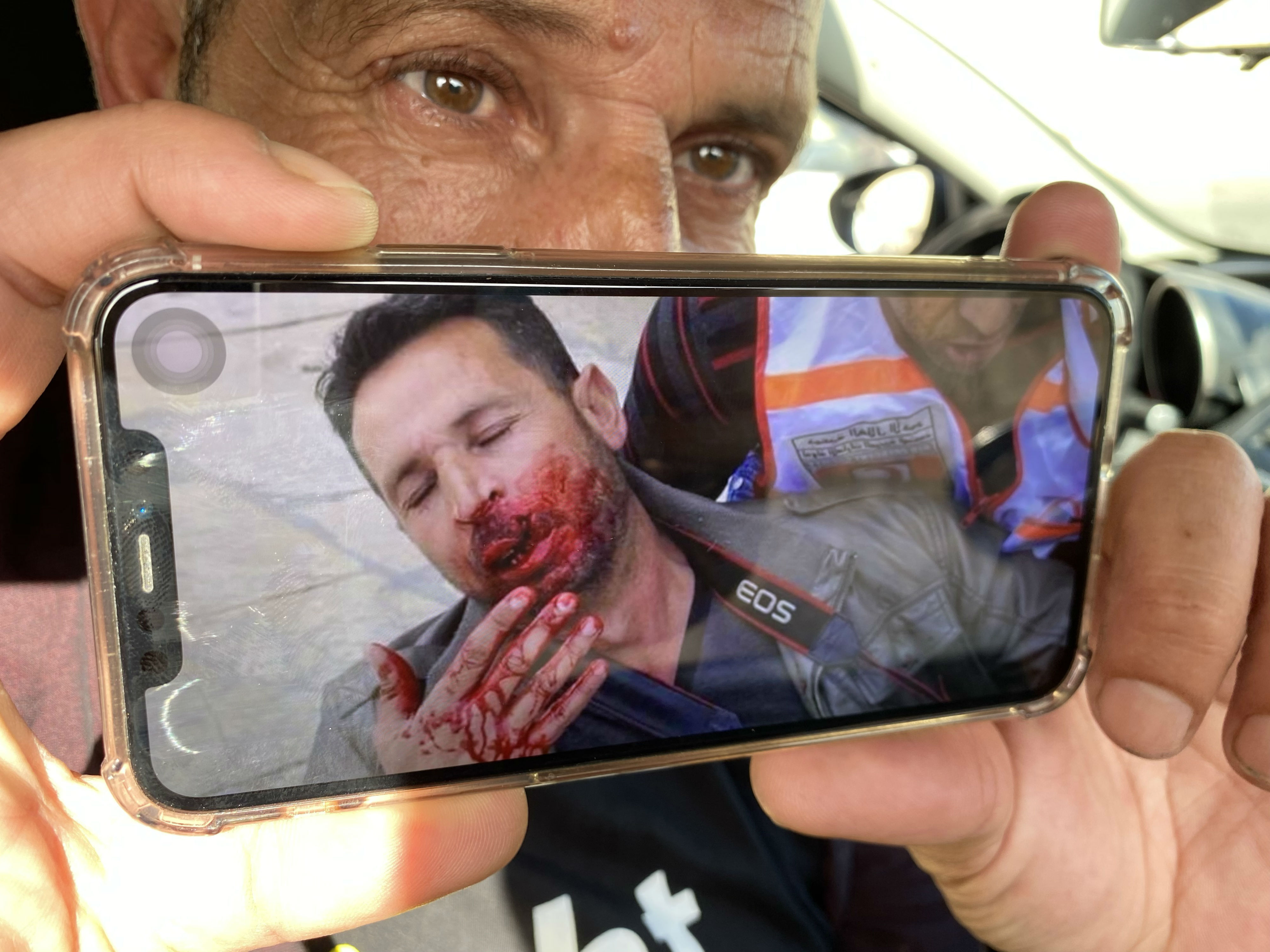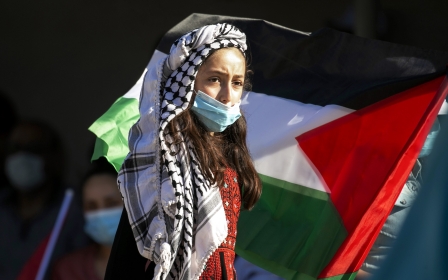For Palestinian journalists, violent attacks by Israeli forces come with the job

Cornered and afraid, 23-year-old Palestinian journalist Sondus Ewies spoke nervously to a group of Israeli officers who gathered around her while she was filming at the Al-Aqsa Mosque compound last month.
"I didn't do anything. I was just filming and doing my job,” she recalled telling them.
Ewies took out her international press card, hoping to avoid detention, but she was met with a cold shrug by an officer who replied: “This is a false card which we do not recognise.”
Israeli officers detained Ewies and confiscated her personal phone. She was then taken in for questioning and handed a three-month ban on visiting the mosque compound, located in occupied East Jerusalem.
This was not her first run-in with Israeli authorities. Ewies has been stopped multiple times while on air and has also been beaten while she was covering various protests.
Stay informed with MEE's newsletters
Sign up to get the latest alerts, insights and analysis, starting with Turkey Unpacked
She told Middle East Eye that she was more afraid of the temporary ban than the actual detention.
Ewies lives in the Palestinian neighbourhood of Ras al-Amoud, just south of the Al-Aqsa Mosque compound, making the latter a central part of her journalistic work. She said she was counting down the hours to enter the mosque compound after it was closed for two months due to the coronavirus pandemic.
Many Palestinian journalists face arrest and temporary bans from the compound on the grounds that they had filmed settler incursions there or Israeli forces assaulting worshippers.
In 2016, Israeli authorities drew up blacklists containing names of Palestinians, including journalists, prohibited from entering the compound.
Since the beginning of June, Israeli authorities have issued around 10 summons to journalists and photographers for interrogation due to their coverage of political events.
Ban on Palestinian news organisations
Ewies is one of many journalists who have endured harassment by Israeli forces while on duty.
Well-known local reporter Christine Rinawi, 31, had been working at Palestine TV, a station operating under the Palestinian Authority's (PA) public Palestinian Broadcasting Corporation, for 10 years when she was detained in December 2019.
The month before, then-Israeli public security minister Gilad Erdan had issued a decision to close down the offices of Palestine TV for six months, claiming that its operation was a violation of the Oslo Accords, which banned the PA's presence in Israeli-occupied East Jerusalem. The order was renewed in May 2020.
Immediately after the closure, the station’s staff in Jerusalem decided to challenge the decision and carry on with their work.
'The officer told me … "You are forbidden from working in Jerusalem, whether in the street, underground or next to the bathroom or salon"'
- Christine Rinawi, reporter
During the third episode of a live broadcast programme in December, Israeli forces detained presenter Dana Abu Shamsia and cameraman Amir Abed Rabbo. Rinawi and another cameraman, Ali Yassin, were also detained shortly afterwards and taken to an interrogation centre.
For Rinawi, the closure of Palestine TV was part and parcel of Israel’s restrictions on the Palestinian media’s documentation of Israeli abuses.
“They tried to assault us and they treated us like criminals,” she told MEE.
“The officer told me: 'go work in Bethlehem or Ramallah. You are forbidden from working in Jerusalem, whether in the street, underground or next to the bathroom or salon'.”
During the course of Palestine TV’s initial six-month closure, Israeli intelligence summoned Rinawi five times for questioning.
Palestine TV is not the only Palestinian news outlet to be banned in Jerusalem by Israeli authorities. In recent years, Al Quds, Palestine Today, Qpress and the Elia Youth Media Foundation were all targeted with bans.
Over the years, Rinawi has suffered assaults as she performed her job. In 2019, she was pushed and shoved by Israeli soldiers during a live broadcast, which was interrupted four times.
In 2015, shrapnel from a sound bomb hit her eye as she covered the situation at the Al-Aqsa Mosque.
A year earlier, she and her cameraman were shot with rubber-coated bullets while they reported the events that unfolded after the kidnapping and killing of Palestinian teenager Mohammed Abu Khdeir.
More dangerous than weapons
Ata Owaisat, 50, from the town of Jabal al-Mukaber in Jerusalem, began his career as a photojournalist 19 years ago. He worked with the Associated Press news agency and Israeli news organisation Yedioth Ahronot.
He said that he has lost count of the number of times Israeli soldiers had broken his camera equipment.
“One of them told me word for word that ‘your camera is more dangerous than weapons’,” he told MEE.
“I have been beaten and humiliated while doing my work, faced obstructions and was questioned, strip-searched, interrogated and banned from Al-Aqsa”.
Owaisat’s journalistic career was abruptly brought to an end in 2013, when he suffered a severe injury and ensuing psychological trauma, including PTSD. He said he finds it difficult to talk about that day.
On 8 March 2013, Owaisat picked up his camera and went to cover clashes at Al-Aqsa, where Israeli forces were firing stun grenades and rubber-coated metal bullets at Palestinians protesting against Israeli violations in the compound.
Owaisat was hit in the mouth by a metal object he couldn’t identify, which caused severe bleeding.
“I lost part of my teeth, upper lip and my face was deformed,” he recalled.
After he was hit, Owaisat momentarily lost consciousness but was soon awakened to kicks and insults before losing consciousness again.
Ambulance crews transferred him to the hospital.
"I saw death with my own eyes,” he said.
Afterwards, Owaisat faced many difficulties with eating, speaking and even smiling. He underwent multiple operations to restore his face and teeth.
He also stopped working for a year, after which he received a medical report detailing the psychological trauma preventing him from resuming his work.
Widespread restrictions
Along with journalists in Jerusalem, Palestinians across the occupied West Bank and the besieged Gaza Strip also face a plethora of violations.
The Palestinian Centre for Development and Media Freedoms (Mada) reported 18 such violations during the month of May, including physical attacks, arrests and the closure of offices across the Palestinian territories.
A recent report by the Palestinian Journalists Syndicate Freedoms Committee also found that Israeli authorities carried out 760 violations in 2019.
Nasser Abu Bakr, the president of the syndicate, commented on the issue, saying that Israel focuses its restrictions and obstruction of journalists in Jerusalem, which it considers its capital.
He added that such incidents have increased in recent months, leading the syndicate to alert the International Federation of Journalists (IFJ) to the high number of infractions against journalists in Jerusalem and have called on it to intervene.
Abu Bakr told MEE that a delegation from the IFJ had demanded that the Israeli government stop its violations and recognise the international press card, to no avail.
"We provide support as much as we can. We have a meeting at the union next week, and the reality of journalists in Jerusalem will be the first on our agenda,” he said.
Middle East Eye delivers independent and unrivalled coverage and analysis of the Middle East, North Africa and beyond. To learn more about republishing this content and the associated fees, please fill out this form. More about MEE can be found here.







